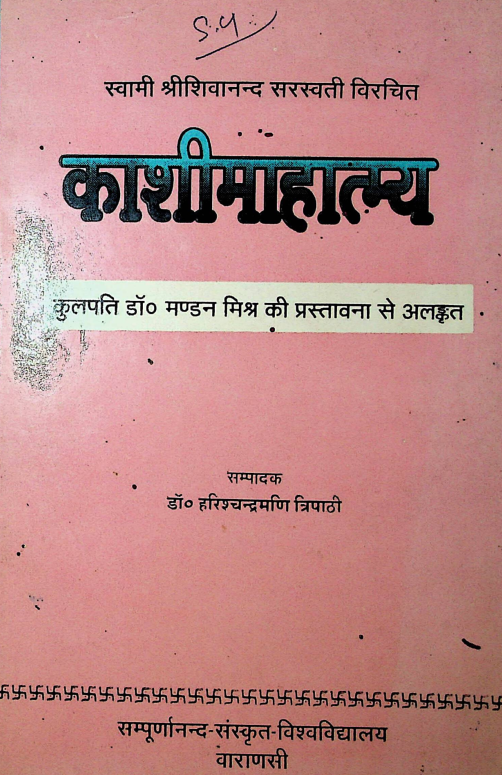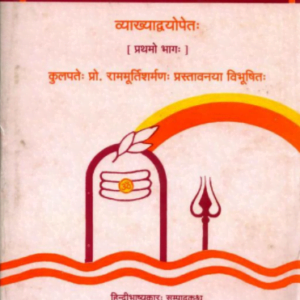Author: Veda Vyasa wrote all the major Puranas and other scriptures. In this section, we are presenting books that show the importance of Kashi based on various Puranas.
Kashi Mahatmya and Kashi Moksh Nirnay
The devotees of Shiva have a special affinity towards Kashi or Benaras. Various Puranas describe the importance of living in Kashi. It is said that those who reside in Kashi realise liberation or Moksha. Ramcharitmanas says:
आकर चारि जीव जग अहहीं। कासीं मरत परम पद लहहीं॥
(Ramcharitmanas, Balkand, 46/4)
Kashi, another name for the ancient city of Varanasi in India, holds profound significance in Hinduism. Known as the “City of Light” and believed to be one of the oldest continuously inhabited cities in the world, Kashi has been a center of learning, spirituality, and pilgrimage for centuries.
Historical and Cultural Significance of Kashi
1. Spiritual Hub: Kashi is revered as the abode of Lord Shiva, one of the principal deities in Hinduism. According to legend, Shiva himself established the city, making it a prime pilgrimage site for devotees seeking blessings and spiritual merit.
2. Religious Activities: The ghats (riverfront steps) along the Ganges River in Kashi are central to the city’s spiritual life. Pilgrims perform rituals, including bathing in the Ganges to cleanse themselves of sins and performing last rites for the deceased, believing that dying in Kashi ensures liberation (moksha) from the cycle of rebirth.
3. Cultural Heritage: Kashi is also a centre for classical music, dance, and scholarly pursuits. It has been home to many notable poets, musicians, and scholars, contributing significantly to India’s cultural and intellectual history.
Liberation (Moksha) in Hinduism
Moksha, or liberation, is a core concept in Hindu philosophy. It signifies the release from the cycle of birth, death, and rebirth (samsara) and the realization of one’s unity with the divine.
1. The Cycle of Samsara: Hindus believe in reincarnation, where the soul is reborn in different forms based on karma (the sum of one’s actions). Samsara is the cycle of life and death that continues until the soul attains liberation.
2. Achieving Moksha: Liberation can be achieved through various paths, including:
– Jnana Yoga (Path of Knowledge): Understanding the true nature of reality and the self.
– Bhakti Yoga (Path of Devotion): Surrendering oneself to a personal deity with devotion and love.
– Karma Yoga (Path of Action): Performing one’s duties selflessly without attachment to results.
– Raja Yoga (Path of Meditation): Practicing meditation and self-discipline to control the mind and senses.
3. Significance of Kashi in Moksha: It is believed that dying in Kashi grants moksha. The city is considered a gateway to liberation, and many Hindus aspire to spend their last days there. The Manikarnika Ghat, in particular, is known as a sacred site for cremation, with the belief that it leads to salvation.
Kashi and the concept of liberation are deeply intertwined in Hindu tradition, symbolizing the quest for spiritual enlightenment and the ultimate release from the cycle of existence.
In this section, I am including all the books that expound the importance of Kashi based on the Puranas and other scriptures.
Kashi Mahatmya and Moksh Nirnay | काशी माहात्म्य और मोक्ष निर्णय
| लेखक : | Various | विविध |
|---|---|
| Book Language | हिंदी | Hindi |
| पुस्तक का साइज़ : | Various |
| कुल पृष्ठ : | Various |
| श्रेणी : | धार्मिक / Religious, साहित्य / Literature, हिंदू – Hinduism |
Kashi Moksha Nirnay of Sureshvaracharya
Two different scholars have translated this book.
Translated by Ambikadatt Upadhyay – 81 MB 
Translated by Ramanand Singh – 30 MB 
Kashi Mahatmya Of Swami Shivananda Saraswati Ed Dr. Harish Chandra Mani Tripathi
Kashi Mukti Nirnay and Kashi Ka Itihas by Swami Shivanand Sarasvati – Himalay Press
Kashi Kedar Mahatmyam – Translated by Shri Vijayanand Tripathi
Kashi Khand of Skanda Puran, Edited by Acharya Shri Karuna Pati Tripathi
Other Relevant Books
Kashi Darshan – Shivanand Ji Saraswati (Disciple of Karpatri Ji Maharaj)
Kashi Garuav – Shivanand Ji Saraswati (Disciple of Karpatri Ji Maharaj)





